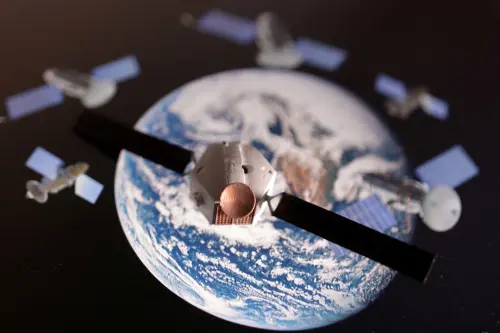BENGALURU/BEIJING/BRASILIA, Feb 24 (Reuters) - Elon Musk's presence in the space industry is about to face increased competition.
His Starlink communications network, a prominent provider of high-speed satellite internet, is now encountering strong challengers, such as a Chinese state-backed competitor and a service backed by Jeff Bezos of Amazon.com.
SpaceSail, based in Shanghai, recently signed agreements to enter the Brazilian market and is in discussions with over 30 nations. The company also initiated operations in Kazakhstan two months later, as confirmed by the Kazakh embassy in Beijing.
Moreover, Brasília is exploring partnerships with Bezos's Project Kuiper and Canada's Telesat, as revealed by a Brazilian official involved in the negotiations. This information is being publicly disclosed for the first time.
Starlink has dominated the deployment of satellites into low-Earth orbit since 2020, surpassing all competitors combined. Satellites operating at these altitudes are known for efficiently transmitting data, providing high-speed internet access to remote communities, maritime vessels, and military operations.
China, on the other hand, poses a significant challenge to Musk's dominance in space. Beijing is heavily investing in alternative services and supporting military research for tracking satellite constellations, as revealed in corporate documents and academic publications not previously disclosed.
China successfully launched a record 263 LEO satellites last year, based on data analyzed by astrophysicist Jonathan McDowell and tech consultancy Analysys Mason.
The emergence of competitors to Starlink has been positively received by Brazil's government, which aims to expand high-speed internet access to remote regions while balancing commercial and political interests.
SpaceSail, a company controlled by the Shanghai municipal government, aims to deploy 648 LEO satellites this year and plans to reach 15,000 by 2030. In comparison, Starlink currently operates approximately 7,000 satellites and targets 42,000 by the end of this decade, according to McDowell.
SpaceSail's ambitions include the deployment of the Qianfan constellation, marking China's initial international venture into satellite broadband. Additionally, China is developing three other satellite constellations and intends to launch 43,000 LEO satellites in the coming years, along with investing in rocket technologies for multiple satellite launches.
The competition in lower-Earth orbit between China and other nations has raised concerns among Western policymakers regarding extending Beijing's internet censorship. The American Foreign Policy Council suggests enhancing cooperation with nations in the Global South to counter China's expanding digital influence.
SpaceSail envisions offering reliable internet access, particularly in remote areas and during post-disaster recovery efforts. Starlink's rapid expansion, including its use during conflicts, has prompted military researchers worldwide, such as those at China's National University of Defense Technology, to receive state funding for developing rival satellite networks.
Chinese companies like Hongqing Technology are attracting substantial state funds for their satellite projects, with a focus on advancing satellite networks and communication systems to bridge technological gaps.
This competitive space landscape prompts innovation and strategic positioning, as industry players vie for key positions before stricter regulations are enforced. Amidst growing space militarization, countries like China are developing tools to monitor and trace satellite constellations, aiming to maintain security and strategic advantage in an evolving space arena.
